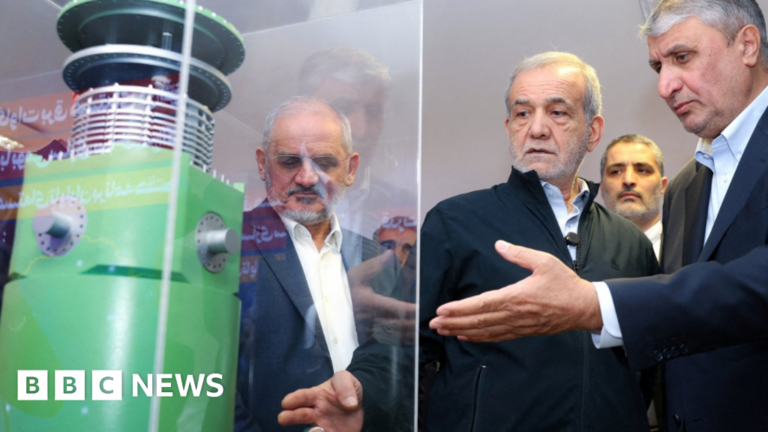BBC Persian
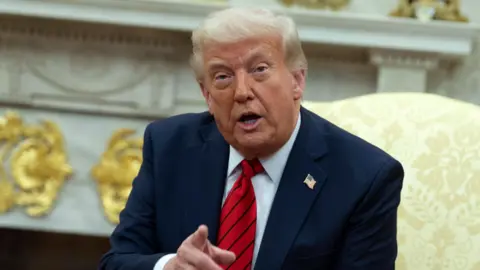 EPA
EPAIran and the US have held a second round of high-stakes nuclear talks in Rome – and agreed to meet again next week – even as hopes for de-escalation are tempered by mounting military threats and mixed messages.
US President Donald Trump reminds Tehran nearly every day of its options: a deal or war.
He has previously said Israel would lead a military response if the talks failed.
On Wednesday, the New York Times reported that Trump had “waved off” an Israeli plan to strike Iranian nuclear sites as early as next month.
“I wouldn’t say waved off. I’m not in a rush to do it,” Trump told reporters in response to the article on Thursday, adding that he preferred to give diplomacy a chance.
“I think that Iran has a chance to have a great country and to live happily without death… That’s my first option. If there’s a second option, I think it would be very bad for Iran.”
After both sides described the first round of talks in Oman last weekend as constructive, Trump had said he would be “making a decision on Iran very quickly”.
Why Iran returned to the table
In 2018, Trump pulled the US out of a 2015 agreement which saw Iran limit its nuclear activities and allow inspections by the International Atomic Energy Agency (IAEA) in return for sanctions relief.
He said it did too little to stop Iran’s potential pathway to a nuclear weapon and reinstated US sanctions as part of a “maximum pressure” campaign to compel Iran to negotiate a new deal.
However, Iran refused and increasingly breached restrictions in retaliation. It has now stockpiled enough highly-enriched uranium to make several bombs if it chose to do so – something it says it would never do.
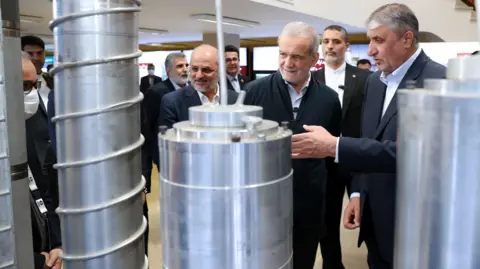 EPA
EPAThe threat of military action appears to have played a role in bringing Iran back to the negotiating table. Yet it insists that is not the reason.
The website of the Supreme Leader, Ayatollah Ali Khamenei, said Iran had agreed to talks only because the US limited its demands strictly to nuclear issues – not out of fear of US and Israeli strikes.
Even so, reaching a deal remains far from certain.
Trump’s Special Envoy to the Middle East Steve Witkoff, who is leading the US negotiating team, posted on X on Tuesday: “Any final arrangement must set a framework for peace, stability, and prosperity in the Middle East – meaning that Iran must stop and eliminate its nuclear enrichment and weaponization programme.”
It came just a day after he had suggested in an interview with Fox News that Iran would be allowed to continue enriching uranium.
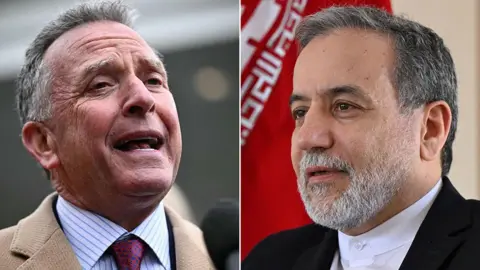 AFP
AFP“They do not need to enrich past 3.67%,” he said, referring to the limit set by the 2015 nuclear deal.
“This is going to be much about verification on the enrichment programme and then ultimately verification on weaponization.”
Iran’s Foreign Minister Abbas Araghchi, the head of the Iranian delegation, responded by noting Witkoff’s “contradictory statements” and stressing that “real positions will be made clear at the negotiating table”.
“We are ready to build trust regarding possible concerns over Iran’s enrichment, but the principle of enrichment is not negotiable,” he said.
Diplomatic flurry
Saturday’s talks in Rome come amid a flurry of diplomatic activity.
Saudi Arabia’s Defence Minister, Prince Khalid bin Salman, visited Tehran on Thursday, delivering a personal message from his father King Salman to Ayatollah Khamenei. He also met Iran’s President, Masoud Pezeshkian.
Iran has warned that any US military action would be met with retaliation against American bases in the region – many of them hosted by Iran’s Arab neighbours.
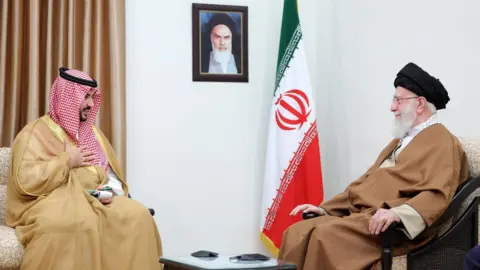 EPA
EPAAt the same time, Araghchi visited Moscow and handed a letter from Khamenei to Russian President Vladimir Putin.
Iran and Russia have strengthened their military ties since the start of the war in Ukraine, with Tehran accused of supplying drones to support Moscow’s war effort.
The Russian parliament ratified a 20-year strategic partnership between Iran and Russia 10 days ago. However, the deal does not include a mutual defence clause.
Meanwhile, IAEA chief Rafael Grossi completed a two-day visit to Tehran this week, meeting Iranian nuclear officials and the foreign minister in a bid to ease tensions and restore inspection protocols.
Atmosphere of distrust
Since Trump returned to office this year, Ayatollah Khamenei has consistently denounced negotiations with Washington.
“Negotiating with this administration is not logical, not wise, nor honourable,” he said in a February speech, just two months before agreeing to the current round of talks.
The supreme leader’s distrust stems from Trump’s withdrawal from the nuclear deal, the “maximum pressure” campaign that followed, and the assassination of General Qassem Soleimani in a US strike in Iraq in 2020.
Ayatollah Khamenei expressed satisfaction with the first round of talks, saying it was “implemented well”.
But he cautioned that he was “neither overly optimistic nor overly pessimistic”.
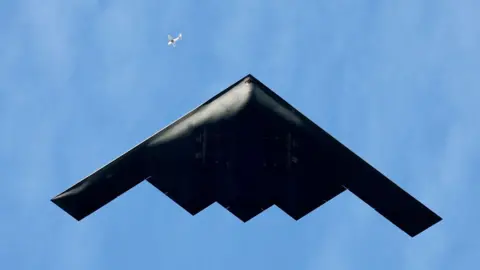 Getty Images
Getty ImagesHe has also previously warned that Iran would retaliate in the event of strikes on its nuclear programme.
Some officials, including his adviser Ali Larijani, have even said that Iran might be “forced” to acquire a nuclear weapon if attacked.
“We are not pursuing weapons, and we have no problem with IAEA oversight – even indefinitely. But if you resort to bombing, Iran will have no choice but to reconsider. That is not in your interest,” Larijani told state TV earlier this month.
Direct or indirect?
Each side is pushing its own narrative about how the talks are being conducted.
The US says they are direct. Iran says they indirect, and that Oman is mediating by exchanging written notes.
After the first round in Muscat, Araghchi acknowledged he had a brief exchange with Witkoff “out of diplomatic courtesy” after crossing paths.
US news website Axios, citing sources, reported the two chief negotiators spoke for up to 45 minutes.
Tehran prefers secrecy. Washington seeks publicity.
After both sides put out positive statements about the first round, Iran’s currency surged by 20%.
Iran’s leadership is well aware of public discontent over the country’s harsh economic conditions – and the potential for protests it may trigger.
For the Islamic Republic, the fear is not just over bombs – it’s protests too.

